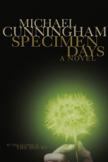It Worked With Woolf, but
The novelist Michael Cunningham leapt into the spotlight with The Hours (1998), a meditative spinoff of Virginia Woolf’s Mrs. Dalloway. Cunningham’s book won the Pulitzer Prize and enjoyed a successful second run in a filmed version four years later. Now he has written another trio of interrelated novellas, inspired this time by Walt Whitman. The first is set in post-bellum New York, the second in the present-day city, while the third features a 22nd-century sci-fi cross-country flight from New York City to Denver. Cunningham is as warmhearted, intense and lyrical as ever; but this book is irredeemably silly.
Specimen Days (the title of Whitman’s 1882 memoirs-cum-reflections) begins with In the Machine, a mostly horrific tale of Manhattan as a belching inferno of dark Satanic mills. Among the wretches trapped in it are a 12-year-old holy fool named Lucas and Catherine, the pregnant whore-with-a-heart-of-gold fiancée of Lucas’s dead brother Simon (crushed to pieces in a terrible industrial accident). The weirdly precocious Lucas has somehow managed to obtain and memorize the contents of Leaves of Grass, which he spouts with oracular solemnity on every conceivable occasion. The lad (who bumps into Whitman on Broadway and receives portentous instructions from him to head north) replaces his brother in a steel plant, where he proves quite competent; but he is increasingly obsessed by the fantasy that the stamping machine he operates is trying to summon him to join his brother in the next world, and that all machines, including those in the textile factory where Catherine works, are lethal, sucking mouths. The conclusion combines horror and redemption in an apocalyptic scene reminiscent of the Triangle Shirtwaist fire in 1911.
The next tale, The Children’s Crusade, reads like a fancy Law and Order episode, with Cat, a black forensic psychologist, trying to solve the mystery of young boys who go around blowing up themselves and their single adult victims with amateurish pipe bombs. (These kids also quote Whitman, though more sparingly.) They are, it develops, being sent out on their lethal mission by a demented old woman, who rescued them when they were abandoned as infants and trained them to be terrorists. This absurdly articulate fiend is an eco-freak and all-purpose radical who has plastered all the walls of her apartment with quotations fromguess who? How anyone could associate such mayhem with Whitman defies comprehension; but in any event the sharp, but tenderhearted, 38-year-old Cat tracks down (actually, gets tracked down by) the last remaining pre-pubertal suicide bomber. On an impulse, she leaves her kind and sympathetic white lover, withdraws $1,000 from an A.T.M. and takes an Amtrak train south with the rescued boy on a blind mission that by the final page is beginning to look deeply ominous.
The last novella, Like Beauty, goes beyond boring in its (ca. A.D. 2150) account of a New York turned into a nightmarishly dystopian theme park. The hero is a simulo (part robot, part human) named Simon, whose job is to beat up masochistic tourists in Central Park who are willing to pay for a sexually flavored mugging. The City, as you might suspect, has been taken over by a very Evil Empire (The Council); and when Simon befriends a Nadian nanny called Catareen (Nadians, by the way, are a congenial race of lizard-like bipeds who have fled to earth from another planet after enduring unspeakable suffering there), who shares his rebellious propensities, they have to flee the City, pursued by a Star Wars-y killer drone firing death rays.
Having barely gotten over the George Washington Bridge into the bucolic, unpoliced territory of New Jersey, Simon (who constantly quotes you-know-who) and Catareen travel by hijacked Mitsubishi, Winnebago and aerial pod to Denver, home of Simon’s original designer, Emory Lowell. Lowell is about to launch a spaceship to escape the hopelessly poisoned confines of the United States, but Simon feels guilty about going along because Catareen is dying (no one even knew that she was old) all by herself. The book ends with Simon making his fateful choice.
What is going on here? Cunningham dedicates Specimen Days to the memory of his mother; and he repeatedly quotes lines 129-30 from Leaves of Grass: All goes outward and onward, nothing collapses,/ And to die is different from what anyone supposed, and luckier. That might apply both to Dorothy Cunningham and to various characters who succumb to death in all three of her son’s stories. So maybe the point is that, despite the wretched tenor of the lives lived and ended here, Whitman’s robust, all-accepting optimism offers some sort of hope. Or that New York (whither Cunningham has moved from California) has always been, despite its feisty vitality, a macabre Unreal City à la T. S. Eliot. Or is this all an updated Love is best, with grisly effects trying to hide the book’s basic sentimentality?
Who knows? What seems certain is that, for all the soft-and-fuzzy advance reviews (Hours film producer Scott Rudin has already optioned the new book), Specimen Days is a botched experimentand one, it is fair to say, that would make the good grey poet spin in his gravein Harleigh’s Cemetery, Camden, N.J., far away from Cunningham’s psychotic Manhattan.
This article also appeared in print, under the headline “It Worked With Woolf, but,” in the September 19, 2005, issue.








